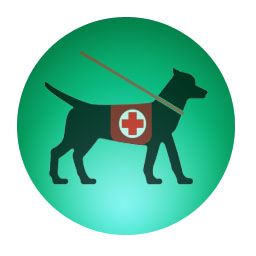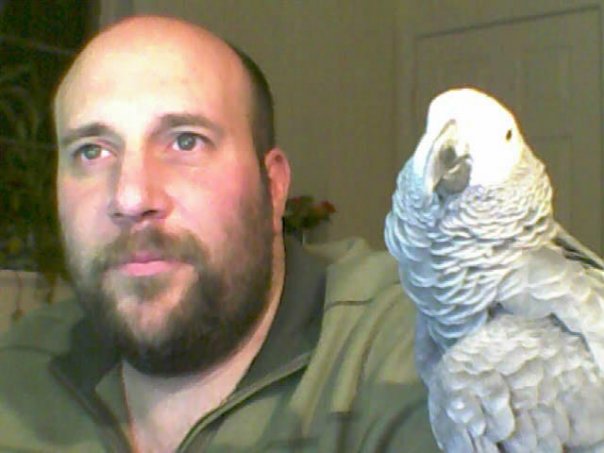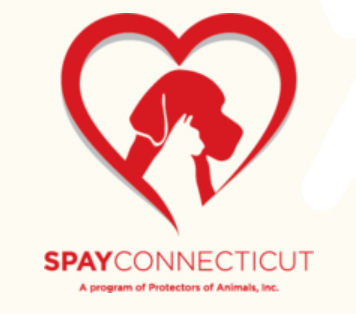
Before we begin it is important to understand the legal differences between a Service Animal, Therapy Animal, and Emotional Support Animal. We look at the laws, definition, and a growing problem for trained, supportive animal companions. There are a lot of conflicting sources when it comes to the legality of animal companions, it is our goal to educate you on current Connecticut statutes regarding your rights and limitations with your animal. Laws in other states will differ, we hope this information is useful. Recourse links start directly below the article.
According to the ADA, a service animal is, “any dog that is individually trained to do work or perform tasks for the benefit of an individual with a disability, including a physical, sensory, psychiatric, intellectual, or other mental disability.” Service animals are defined by Title II and Title III of the ADA.
Emotional support animals, animals that provide “comfort” and animals used in therapy are not service animals under the


current law. A doctors note does not make any animal, trained or untrained, wild or domestic a legitimate service animal under the law. Why is it important to know all of this? The short answer is that you can find yourself facing legal problems, and the laws differ from state to state. Ripple has done some research you may find useful. The “Service, Therapy, and Emotional Support Animals” tab below provides links to all of the important laws on both state of Connecticut and Federal levels.
If you google “Emotional Support Animal” the results can be extremely misleading. The first four listings are paid advertisements, for a fee they can “certify” your ESA in as little as 24 hours. They make claims that imply this certification supersedes a no pet clause in a lease, that you will pay no pet fees when flying, and you’ll avoid breed and size restrictions. You’ll receive things like a lifetime registration ID kit, and many of these sites offer vests, leashes and other bling that will identify your pet as an “official” service animal.
By law, airlines have the right to ask for specific documentation that describes the traveler’s disability. One of the documents that can be requested is a note from a licensed mental health professional stating that you are under their direct care, the date, and type of license the professional holds and the state in which it was issued. This immediately disqualifies any online “therapist” regardless of their licensing or the fees you paid. You may also need documentation from a veterinarian stating that the animal is fully vaccinated and not a health threat to any other traveler. According to the ACAA,
“Airlines are not required otherwise to carry animals of any kind either in the cabin or in the cargo hold. Airlines are free to adopt any policy they choose regarding the carriage of pets and other animals (for example, search and rescue dogs) provided that they comply with other applicable requirements (for example, the Animal Welfare Act). Animals such as miniature horses, pigs, and monkeys may be considered service animals. A carrier must decide on a case-by-case basis according to factors such as the animal’s size and weight; state and foreign country restrictions; whether or not the animal would pose a direct threat to the health or safety of others; or cause a fundamental alteration in the cabin service. Individuals should contact the airlines ahead of travel to find out what is permitted.
Airlines are not required to transport unusual animals such as snakes, other reptiles, ferrets, rodents, and spiders. Foreign carriers are not required to transport animals other than dogs.”
Here is the problem we are facing now… Speaking personally as a Recovery Support Specialist and a longtime animal lover, I know two things. First, some people need an animal companion for emotional stability; they help prevent panic attacks, keep anxiety at bay, and fight depression. Second, online scammers are making it easy for anyone to abuse the system; people are using these so-called certifications to bring exotic animals onto airplanes, buses, trains, restaurants, and other businesses. People are afraid of being sued or being labeled as someone who discriminates against those with a legitimate disability.
Business owners who know the laws are putting people with mental illness in very uncomfortable situations. These animals are there to help alleviate stress, yet the ESA’s very presence can cause stressful interactions to occur. If a persons safety net is the thing being challenged, it can lead to a mental health crisis.
Let’s face it; if this issue is left unaddressed, it will only add to the stigma of those living with mental illness. When fake ESA owners loudly defend their “right” to bring their animals into public or private establishments, it causes a scene. In February 2018, United Airlines announced it was going to change its policy regarding Emotional Support Animals after a passenger tried to bring a peacock on board. The airline told the owner of the bird that it would not be allowed on the plane on three separate occasions. Airlines have reported, sugar gliders, spiders, roosters, ducks, turtles, various types of lizards, and snakes have been claimed as Emotional Support Animals.
Where does the State of Connecticut stand on ESA’s? On November 27, 2018, the Office of Legislative Research issued a brief, it read as follows:
“The Americans with Disabilities Act (ADA) requires state and local government agencies, businesses, and non-profit organizations (i.e., ADA covered entities) that provide goods and services to the public to make reasonable modifications in their policies, practices, or procedures to accommodate people with disabilities. The ADA’s service animal rules fall under this general principal.
Service Animal Defined:
According to the U.S. Department of Justice’s (DOJ) FAQ about Service Animals and the ADA, a “service animal” is a dog that has been individually trained to do work or perform tasks on behalf of an individual with a disability. The tasks the dog performs must be directly related to the person’s disability.
Emotional support, therapy, comfort, or companion animals are not considered service animals under the ADA. Such animals provide comfort by being with a person, but because they have not been trained to perform a specific job or task, they do not qualify as service animals.
The DOJ’s ADA regulations also recognize as service animals miniature horses that have been individually trained to do work or perform tasks for people with disabilities. Miniature horses generally range in height from 24 inches to 34 inches, measured to the shoulders, and weigh between 70 and 100 pounds.”
When traveling you will also want to check the laws regarding service animals in the states you are visiting. According to The Washington Post there are at least 20 states that have created laws making it illegal to “fraudulently misrepresent” any animal as a service animal to a public place or business. Fines may be levied against the pet owner with penalties of up to $250 for each violation.
Service Animal Defined – State of Connecticut, Office of Legislative Research
Service Dogs and the Law – State of Connecticut, Office of Legislative Research
Service Animal Requirements – U.S. Department of Justice
Frequently Asked Questions about Service Animals and the ADA – U.S. Department of Justice
Service Animals (Including Emotional Support Animals) – U.S. Department of Transpertation
Animal Welfare Act – United States Department of Agriculture
Americans with Disabilities Act – State and Local Governments (Title II)
Americans with Disabilities Act – Public Accommodations and Commercial Facilities (Title III)
East Coast Assistance Dogs: Our mission is to enable people with disabilities to gain greater independence and mobility through the use of specially educated dogs.

ECAD, Educated Canines Assisting with Disabilities is a 501(c)(3) nonprofit organization and we depend on generosity of people like you to continue changing lives.
Location: Torrington, CT
Fidelco Guide Dogs: Every seven minutes in our country someone becomes blind or visually impaired. These people are not statistics. They are our children, parents, friends, neighbors, co-workers and employees.

For some, the cause is genetics. For others it’s disease, accident or war. For most, it is an irreversible change. According to a recent study*, 30 million Americans suffer from the leading causes of vision loss. That number is expected to increase dramatically in the next ten years, largely as a result of the aging Baby Boomer population.
Locations: Bloomfield & Wilton, CT
Guiding Eyes for the Blind: We are a 501(c)(3) nonprofit organization that provides superbly bred and trained dogs to people who are blind and visually impaired.

Our dogs are known for their exceptional temperaments and success at helping people gain independence and to expand their horizons of opportunity. At our facilities in Yorktown Heights, NY, and Patterson, NY, we breed, raise, and train exceptional dogs. Then we connect them to people who are seeking increased freedom and independence, so that together, they can experience all kinds of life adventures.
For information please call: (800) 942-0149
Mutts Mending Mankind: This program was founded by the proud daughter of a Vietnam Veteran who learned that on average we lose 22 veterans a day to suicide.

She created Mutts Mending Mankind and combined her knowledge of rehabilitating and training rescue dogs, with her desire to help our nations heroes. While the program started out initially for just Veteran’s, it has grown in numbers now including first responders, and civilians. We have also branched out and train service dogs for seizure detection, mobility assist, depression and anxiety alert.
Pets for Vets – This shelter chapter operates out of the Ridgefield Operation for Animal Rescue (ROAR) and serves Veterans in the following communities: Danbury, Newtown and Ridgefield in Connecticut and Armonk, Brewster and Mt. Kisco in New York.

The ROAR shelter is thrilled and honored to work in conjunction with Pets for Vets as a shelter chapter. Together, we will be able to not only rescue many loveable dogs and cats but also match them with Veterans who will benefit immensely from their companionship.
Location: Ridgefield, CT
The Exceptional Pet is proud to be the trainers for The Exceptional Sidekick Service Dogs and after seeing the difference their dogs were making in people’s lives.

We decided to offer the option for our Certified trianers to help train privately owned dogs as perspective service dogs. We have many requirements that are put in place to maintain the integrity of all service dogs. We will not work with anyone that does not have a qualifying disability and we will dismiss dogs from the program if it is not suitable for service dog work.
Location: Newtown, CT
The Exceptional Sidekick Service Dogs: Founded in 2016, The Exceptional Sidekick Service Dogs in Newtown, CT, aims to transform lives.

We do this by partnering exceptional psychiatric service dogs with children and adults with psychiatric disabilities, free of charge. Our program brings together school communities who work cooperatively to raise and train the dogs as well as educate their peers about psychiatric challenges.
Location: Newtown, CT
Need help feeding a four legged family member?
Every pet owner knows how amazing animals are; they become apart of our lives and sometimes help us through difficult times. We know everyone needs a little help once and a while, here are some truly awesome charities who remembered the other members of the family who might need a meal.

Animal Outreach Society Pet Food Pantry – Animal Outreach Society is a nonprofit 501(c)(3), completely unpaid volunteer run organization. The mission of Animal Outreach Society is to provide resources that improve the lives of animals through programs tailored to the needs of pet owners experiencing financial hardship.
Location: Bridgeport, CT
Bear’s Pet Food Pantry was started with the idea that no one should have to choose between feeding their pets and feeding themselves. By providing pet food assistance to people who are experiencing financial hardship, we will be able to find alternatives to abandoning or surrendering pets to local shelters due to lack of food and be able to keep pets and their families who love them, together.
We provide approximately 1 month of food per animal with a maximum of 40 lbs. Assistance will be provided up to a maximum of 5 animals per household and no animals can be added to the household at anytime.
Location: Old Saybrook, CT
Connecticut Humane Society’s Pet Food Pantry: provides quality pet food at no cost for people in financial difficulty who are struggling to afford their pets. Doing so keeps the pet in the home with the family who already knows and loves them best, and out of a shelter. The pantry currently provides pet food for several hundred dogs and cats each month, with a community need that only continues to grow.
Locations: Newington – Waterford – Westport
FRIENDS of ANIMALS – Low Cost Spaying & Neutering Program: Pet owners may purchase a certificate from Friends of Animals that can be used for a routine spay or neuter surgery at any of FoA’s participating veterinary hospitals.
From its beginning in 1957, FoA has assumed a leadership role in advocating low-cost spaying and altering as the most effective means of preventing the births of dogs and cats, and their subsequent abandonment, suffering and mass killing. For more than six decades, they have operated the only nationwide breeding control program in the United States facilitating more than 2.7 million spay/neuter procedures.
Location: National Program
SpayCT.org: A service of Protectors of Animals, Inc. offers both an online directory and phone number you can call. Their up-to-date list pf clinics and programs can help you find a low cost spay/neuter option for your families cats and dogs. The cost of surgery should not be an obstacle. There are many low cost spay/neuter options in Connecticut.
Call (860) 216-1449 for information.
Location: Statewide
Pet Compassion Care Line: Losing a pet is one of the most difficult things a person can experience. Whether it is sudden or anticipated, the loss of a pet is a highly emotional time. We are proud to offer the Pet Compassion Careline, exclusive to our customers. Available in English, Spanish and French, pet parents and their families will have access to experienced, professional, and confidential counselors.
Life is not easy, and sometimes it can take unexpected turns. There may come a time when we become unable to care for ourselves or a pet, and finding a new home for our faithful companions is not always possible. When making such a difficult choice, we want to remind you that there are differences between animal shelters. Not all are no-kill shelters, and after time passes, a healthy animal could be put down if not adopted.
We genuinely hope giving up your pet is something you never have to face, but if there is no other choice, we would like you to know about nokillnetwork.org and provide a direct link to Connecticut no-kill shelters HERE.








